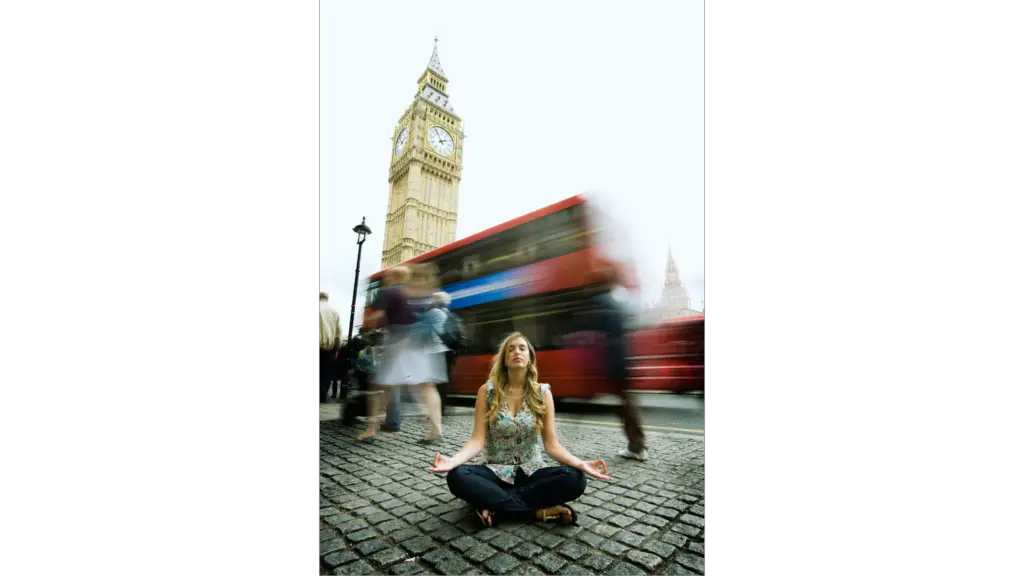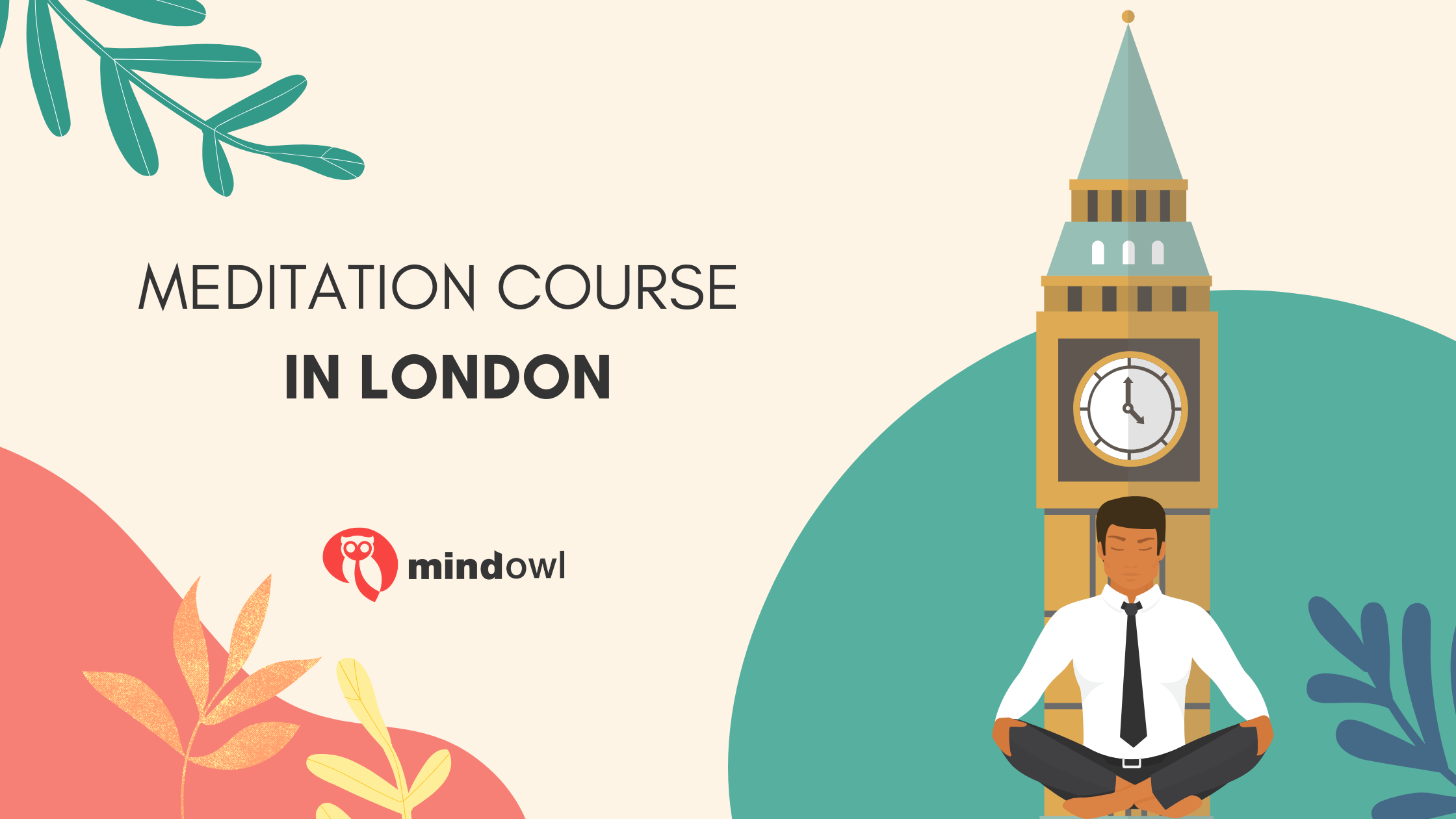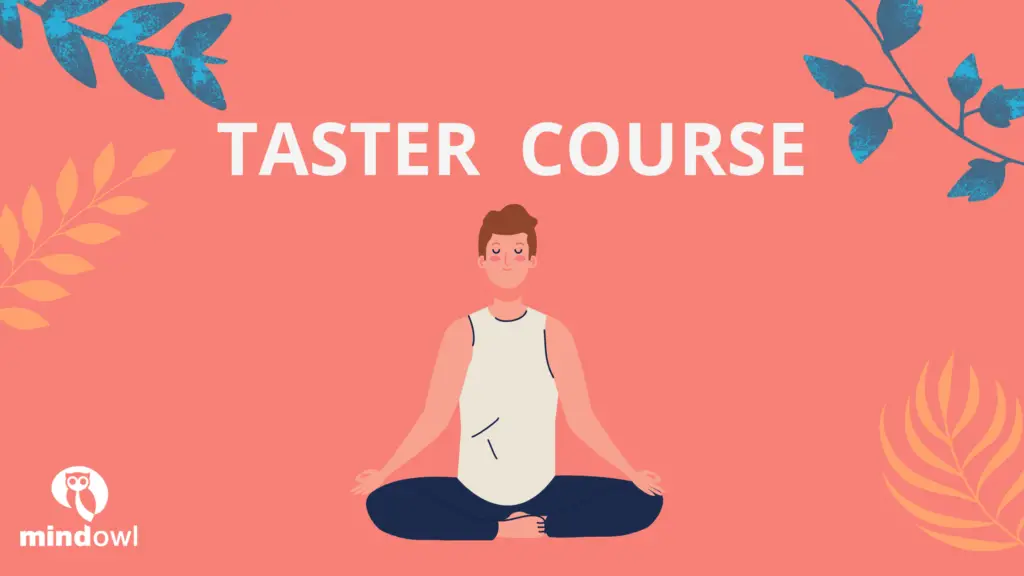Most people have heard about the amazing benefits of meditation. We’ve been told that meditation and mindfulness practices can improve our everyday lives by boosting feelings of balance and equanimity, reducing stress, anxiety and blood pressure, and helping us develop greater peace of mind. Unfortunately, lots of people don’t feel confident meditating on their own. Less experienced practitioners or complete newcomers to meditation may want someone to guide them, to give them structure, and help them realise their aims and intentions.
Thankfully, there is now a wide range of options for people who want some guidance; there are meditation apps, online courses, mindfulness classes and drop-in meditation sessions all over the place. And in densely-populated London (the home of MindOwl), there are more options to choose from than in most places. In today’s article, we’ll explain what meditation can do for you, before diving into how different courses and classes work and listing some of the best meditation courses in London.

Meditation is more than just one thing
One of the first things you need to understand when embarking on your journey towards a calmer mind is that not all meditation is the same. The term ‘meditation’ encompasses a wide range of different disciplines, practices and spiritual traditions. So before we start going through what a meditation course can do for you, let’s quickly explain some of the main forms of meditation there are.
Mindfulness Meditation
Mindfulness Meditation is a form of mental training which focuses on improving concentration, boosting present moment awareness, and reducing feelings of anxiety and stress, in order to calm the mind. Using meditation techniques such as deep breathing, body scans, and the use of meditative anchors, mindfulness meditation is about training your mind to become less easily distracted and more focused on what you’re doing from moment to moment. For more on the distinctions between meditation and mindfulness, read our article on the subject.
Transcendental Meditation
Transcendental Meditation is a form of mantra-based practice intended to provide deep relaxation. It has been championed by celebrities such as Oprah Winfrey and Hugh Jackman; therefore, you might not be surprised that courses are pretty expensive, and that the trademarked TM organisation only lets trained instructors and students practice the discipline. Our article on the difference between Mindfulness and Transcendental Meditation goes into more detail on this.
Vedic Meditation
Vedic Meditation has its roots in the Sanskrit texts of ancient India. The Vedas were a large body of ancient Indian religious texts, published between 700 and 500 BCE. Vedic meditation generally focuses on finding stillness and peace of mind by withdrawing your attention from all the disturbances around you. As well as influencing various different strands of meditation, this ancient tradition also represents the root of modern yoga.
Other forms of meditation
There are numerous other types of meditation, all stemming from different religions, regions and belief systems. Loving-Kindness practices such as Neti Neti Meditation seek to cultivate positive emotions, empathy and compassion, while Insight Meditation techniques such as Self-Directed Neuroplasticity look to help practitioners grow more of an understanding of their own brain. To find out more about the different meditative methods available to you, check out our article on the six main types of meditation.

Why Meditate?
For centuries, meditation has been used to reduce anxiety and stress, increase wellbeing, and foster compassion and empathy. Scientific research has found that mindfulness meditation reduces stress hormones like cortisol and increases serotonin, dopamine, and oxytocin levels — all of which play a role in mood regulation. Meditation has also been linked with improved memory and reduced anxiety, as well as a greater sense of insight into your mind and how it works.
But meditation can be really difficult — many people struggle with the idea of sitting still and “switching off your mind”. Ultimately, it takes time to train yourself to observe the present moment, separate yourself from your thoughts, and cultivate positive emotions, rather than getting caught up by negative feelings and angry reactions. Don’t worry if you struggle to begin with; there are plenty of resources that can help you access the benefits of meditation.
What happens when you meditate?
So what’s behind all these amazing benefits? Well, when you meditate, you trigger the parasympathetic nervous response, which encourages the mind and body to go into a “rest and digest” state, rather than a state of “fight or flight”. This bodily response is what produces increased calmness and balance, meaning that over time, regular meditation practice can train your brain to respond, instead of reacting.
Exactly how this manifests itself depends on which form of meditation you’re practising. While Mindfulness-Based Cognitive Therapy (MBCT) may enhance your awareness of thought patterns and habits, Transcendental Meditation focuses on inducing temporary relaxation, and daily mindfulness exercises can lead towards you being more present-minded and mindful in ordinary tasks.
How much does a meditation course cost?
So how much do you have to fork out in order to access the benefits of meditation? Well, as you’ll see from the following list, meditation and mindfulness courses can vary massively in price. While some organisations and centres offer free classes and spaces for practice, others will charge substantial fees for their training. It’s important to do your research in advance, in order to avoid paying over the odds for a course. While prices vary, you can usually access good quality meditation training for an affordable fee, if not for free.
Next, let’s take a look at some of the most popular and well-established places to learn how to meditate in London.
5 Of The Best In-Person Meditation Courses in London
Shortly, we’ll take a look at how you can become a mindfulness meditation master all from the comfort of your own home. But first, let’s explore some of the most popular in-person courses and classes available to Londoners in search of a great meditation space.
Inner Space, Covent Garden
If you’re after some quick meditative guidance that doesn’t cost an arm and a leg, Inner Space offers free half-hour lunchtime and evening meditation classes at its Covent Garden and City branches. For newbies looking for some in-depth guidance, there are also ‘learn to meditate’ courses on offer.
London Buddhist Centre, Bethnal Green
The London Buddhist Centre is another totally free meditation space. Here, you can practice two main courses, Mindfulness of Breathing and Metta Bhavana (a form of Loving-Kindness meditation). Meditation classes are held throughout the week, along with yoga and Buddhism sessions. Check out their website for more information.
Re:Mind Meditation Studio, Victoria
This meditation centre is another popular wellness destination for Londoners. A wide variety of meditation and mindfulness classes are on offer, including drop-in meditation sessions from 30 to 60 minutes, Zen sessions, and more alternative therapies like crystal sound baths and reiki. Most classes cost around £22 — you can find out more here.
The Mindfulness Project
Mindfulness-Based Stress Reduction (MBSR) is an eight-week mindfulness program designed to reduce stress and anxiety, ease physical pain and improve mental health. Based in Central London, The Mindfulness Project offers comprehensive courses in MBSR, as well as secular and evidence-based training in a variety of other areas. Courses on Mindfulness-Based Cognitive Therapy (another therapeutic application of mindful techniques), mindful living workshops, and meditation classes are all available here.
Inhere
Inhere was London’s first ever teacher-free drop-in meditation studio. It launched its City classes in 2017, aiming to give everyone the chance to develop a healthy relationship with their mind by allowing everyone to have a totally personal experience of meditation in which they’re in control.
Rather than relying solely on meditation teachers, this space uses custom-built meditation pods, in which a number of different guided modules, soothing soundscapes and instructional audio tracks are available during sessions that last between five and 30 minutes. These guided meditations run throughout the day, and are designed to fit in around participants’ daily routines. You can get in touch with Inhere to find out about pricing.
The Middle Way Approach to Meditation
As we’ve now explored, there are plenty of options available when it comes to practising meditation in-person in the UK’s capital. However, we think there’s a better alternative.
At MindOwl, we believe in a middle way approach to meditation, which takes into account the roots of mindfulness in Buddhism, Hinduism and other ancient spiritual practices, while integrating useful concepts and techniques from modern psychology and science. While the organisations we’ve mentioned today all provide useful services, none of them take full advantage of the amazing relationship between meditation and psychology.
If you want to access the benefits of mindfulness meditation in your everyday life, this is the way to go. And we’ve got a collection of courses designed to help you achieve exactly that.
Our new membership plan allows you to tailor your own meditative journey by suggesting course ideas and letting us know the biggest problems you’re facing. Through a range of online courses dedicated to helping you develop balance, clarity, inner peace and equanimity, the MindOwl core pack could be exactly what you need to feel happier, calmer and stronger.
Let’s take a look at the main courses we’re offering right now:
Meditation Taster Course
Our free Meditation Taster Course is designed to give you some useful insight into the world of mindfulness meditation, without taking up too much of your time or energy. Over a short selection of slides, videos, and guided meditation recordings, we’ll give you the building blocks of your practice, starting with the question “Why Meditate?”
This free training will give you all the basics and put you in a great position to push on and learn more. You can find out more about this taster course here.
Beginner Meditation
Our Beginner course starts with the basics, teaching you the fundamentals of meditation, asking what the practice entails and addressing what most people get wrong, before going a little deeper into the workings of the brain. Looking at a wide range of useful concepts and ideas relating to mindfulness and psychology, we focus on how stabilising the mind and cultivating positive emotions can help you generate real happiness. Our Beginner course is designed to give you all the tools you need to be able to practise meditation on your own.
Intermediate Meditation
This course moves on to focusing on how to develop clarity and equanimity both in your meditation practice and in your daily life. Here, you can access lessons on a wide variety of different techniques and methods including “The art of simplification”, “Noting ‘gone'”, and “Cultivating Internal Acceptance”. Within this course, you’ll learn how to be more accepting of yourself, and you’ll get better at separating yourself from unhelpful or negative thoughts and feelings. Our Intermediate Course is all about stepping on the foundations of the Beginner course in order to improve your knowledge of meditation and make you a more well-rounded, observant and grateful individual.
Advanced Meditation
In this course, we encourage participants to dive deep into their sense of self. Through a range of exercises and guided meditations, we’ll help you examine how you perceive yourself and work on how you can cultivate a more positive mindset and a greater sense of awareness. Here, we’ll look into more complicated concepts such as Non-Duality and ‘Pure Awareness’, using simple terminology and practical instruction to show you how these meditation techniques can help improve your life. The grounding you will have received from our Beginner and Intermediate courses will come in super handy here.
Outside our core pack, we also offer a range of courses based around the concept of Emotional Intelligence. And as our membership grows and we take on the ideas of people within the MindOwl family, we’ll continue developing new courses in Non-Dual Awareness, the Psychology of Awakening, and whatever else our online community recommends. After all, we’re here to help you.
If you’re still not sure exactly how meditation can benefit you, our taster course is the perfect place to start. It’s totally free, and if you don’t see any benefits, there’s no pressure to stick around.
Frequently Asked Questions:
What happens during meditation classes?
It depends on what type of meditation you choose to practise. Mindfulness exercises will train you to notice and observe what’s happening in the present moment, while Transcendental Meditation will ask you to repeat a unique mantra, and more experimental breathwork practices will encourage you to try out new breathing patterns. Meditation teachers may instruct you to close your eyes, or you might keep them open. You may sit on the floor, or a chair, or you might stand. Meditation encompasses all sorts of different techniques and methods, so go in with an open mind and as few expectations as possible.
Do I have to attend a formal course?
Absolutely not! If you feel as though you have the time and energy to commit to a course or a series of lessons, that’s great. But if you don’t, you can still access the amazing benefits of mindfulness and meditation at various points in your daily life. By practising daily mindfulness techniques like mindful communication and mindful breathing, you can have better relationships, a greater sense of calmness and peace of mind, and more confidence in yourself. If you want a little more guidance on the type of exercises you can integrate into your daily life, check out our Quick Mindfulness Exercises article.
What is Mindfulness-Based Stress Reduction?
We spoke earlier about Mindfulness-Based Stress Reduction, a targeted program which uses mindful techniques to help practitioners improve their mental health, manage stress and anger, and become more aware of their mind and body. However, you might still be a little confused about exactly what the practice entails. This form of therapy uses a variety of meditative and movement exercises to help relieve tensions and stresses and cultivate positive emotions. If you want to find out more about MBSR, check out our article on the benefits of the Mindfulness-Based Stress Reduction.
MindOwl Founder – My own struggles in life have led me to this path of understanding the human condition. I graduated with a bachelor’s degree in philosophy before completing a master’s degree in psychology at Regent’s University London. I then completed a postgraduate diploma in philosophical counselling before being trained in ACT (Acceptance and commitment therapy).
I’ve spent the last eight years studying the encounter of meditative practices with modern psychology.


